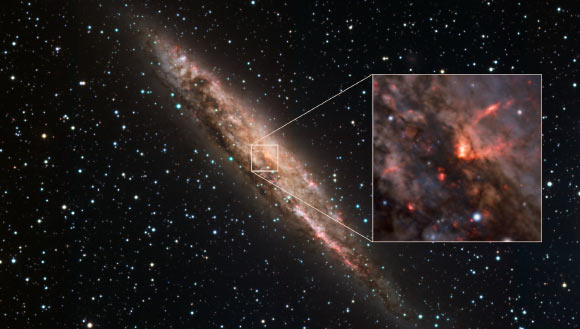Astronomers using the MUSE instrument at ESO’s Very Large Telescope (VLT) have detected supermassive black hole-driven winds in the barred spiral galaxy NGC 4945.
NGC 4945 resides over 12 million light-years away from Earth in the constellation of Centaurus.
Otherwise known as Caldwell 83, this galaxy was discovered by the Sottish astronomer James Dunlop in 1826.
NGC 4945 hosts one of the closest active supermassive black holes to Earth.
“At the very center of nearly every galaxy is a supermassive black hole,” ESO astronomers explained in a statement.
“Some, like the one at the center of our own Milky Way, aren’t particularly hungry.”
“But NGC 4945’s supermassive black hole is ravenous, consuming huge amounts of matter.”
The astronomers used the MUSE instrument at ESO’s Very Large Telescope (VLT) to study the supermassive black hole in NGC 4945.
“This messy eater, contrary to a black hole’s typical all-consuming reputation, is blowing out powerful winds of material,” they said.
“This cone-shaped wind is shown in red in the inset, overlaid on a wider image captured with the MPG/ESO telescope at La Silla.”
“In fact, this wind is moving so fast that it will end up escaping the galaxy altogether, lost to the void of intergalactic space.”
“This is part of a new study that measured how winds move in several nearby galaxies,” they added.
“The MUSE observations show that these incredibly fast winds demonstrate a strange behaviour: they actually speed up far away from the central black hole, accelerating even more on their journey to the galactic outskirts.”
“This process ejects potential star-forming material from a galaxy, suggesting that black holes control the fates of their host galaxies by dampening the stellar birth rate.”
“It also shows that the more powerful black holes impede their own growth by removing the gas and dust they feed on, driving the whole system closer towards a sort of galactic…
Read the full article here

